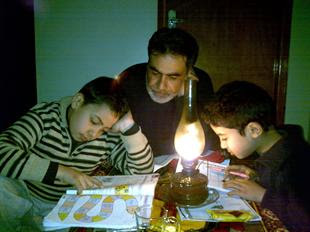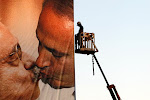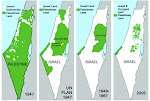'In Rafah, they left only air to breathe--contaminated with black smoke'

The bombardment in the Gaza Strip is relentless. It's been three hellish weeks now. Jawad Harb, a CARE aid worker, describes in detail the strikes on his own neighbourhood on the border with Egypt. (It's where the IDF is obliterating houses which they fear might hide entrances to smuggling tunnels. Israeli officials are proposing that this could be a new southern DMZ as part of a ceasefire. But there are families who live here.) After CARE's warehouses and distribution sites came under heavy bombing yesterday, the charity was forced to halt distribution of fresh food and medicines funded by the European Commission's Humanitarian Aid department. 88% of besieged Gaza now is dependent on humanitarian aid. If aid agencies can't distribute, then people suffer even more. For Palestinians, the death toll is more than 1100; around half are civilians; at least one third are children, according to WHO. 5,100 people have been wounded, many maimed for life. A UN warehouse was shelled, and its supplies are blazing. Five tanks of fuel complicate that tragic fire and put the homeless people sheltering there at great risk. And still the offensive goes on...
Here is the latest journal entry from Jawad, who finally got generator power and can transmit sporadically.
Two days ago, Israel warned residents in my neighbourhood to flee their houses near the border with Egypt ahead of planned bombardments of cross-border tunnels.
Yesterday, January 13th, at 3:15 p.m., it was relatively quiet. The air strikes have been every 30-45 minutes at the border, about 500 metres away from our neighborhood. A group of 20 children were playing downstairs together, including three of my kids. I was on the balcony of my house on the 2nd floor, watching the children playing hide and seek.
At 3:30 p.m., suddenly and violently, non-stop air strikes started. The border with Egypt and the nearby neighbourhood was heavily bombed. There was an air strike every five minutes, and thick black smoke 150m away from us.
After the attack started, there was an uncontrollable panic, everybody was trying to escape the chaos. People were running downstairs with whatever they managed to grab from their houses. More than 90 children of all ages were running toward the north, to nowhere, and their parents were running after them.
In the middle of this horror, I was thinking about my 86-year-old paralyzed father, who was unable to run like others.
My wife quickly gathered my children, and my older brother collected some blankets with his oldest sons. I rushed very quickly to the ground floor where my father lives. With the help of my other brother, we carried my father and quickly left the house.
“I was afraid I would be left alone to die under the bombing,” said my father, with his eyes full of tears. “Thank God, I have my sons living with me.”
There, in the road 100 metres away from the neighbourhood to the north, about 50 families – 350-400 people – were gathering in panic, including about 120 children. The air strikes continued shaking the ground under us, hiding the voices of the kids screaming and crying.
We all knew that the UN schools were full and can’t accommodate any more people.
“This evokes the old memories of Nakba,” said Abu Muhammad Shakshak, a 66-year-old retired teacher. “I was six years old when I first experienced a similar event like this. We ran along the beach and the bombing was chasing us faster than the winds.”
It was about 5:15 pm when I received a call from CARE International’s office in Ramallah. All eyes were fixed at me; people thought I had a magic solution for them while I was on phone. During the call, there were two strong air strikes, and I was shouting into the phone.
“It is getting colder here, the children will die from the cold weather,” said a crying mother to me.
I talked with the UN emergency coordinator, who promised to make a shelter camp for people if the air strikes continued and people could not go back home. I was surrounded by the homeless frightened people from my neighbourhood.
It started to get windy and colder now in the street. People started to get more worried and frightened. The bombing had not stopped, and with each air strike, many children threw themselves onto the ground, hiding their faces against the sand like ostriches, thinking if they don’t see the missiles falling, they will not get hurt.
“Are we going to be burned by the bombs like the children we watch on TV?” asked a 14-year-old child from the neighbourhood, horror in her eyes.
Parents - including myself - were hugging the children. Everyone knew I am an aid worker with CARE International, and I was trying to calm people down and letting them know that I was doing everything I could to ensure better humanitarian conditions for them.
“They destroyed everything. They only left one thing - the air to breathe, and now they are contaminating it with black smoke,” said Abu Muhammad Shakshak.
The air strikes ended at 5:45 p.m. We waited outside until 6 p.m., and then people started to move closer to their houses. An hour later, we entered our houses again, and we all packed go-bags of necessary items so we would be ready to run if the bombings started again.
The air strikes commenced again last night at about 10 p.m. and continued through the night, but further away and less intensive than what it was like in the evening. We finally slept at 5 in the morning, and were awake again at 8 am, waiting for another war day.

photos credits CARE and wire services




















3 comments:
Enough already
Ben Caspit, an analyst, believes that Cast Lead will have a deterrent effect on Israel’s neighbors: “Olmert established a new principle to which the entire Middle East has become accustomed: One can no longer play games with Israel without getting hurt. Nasrallah said that had he known how Israel would react, he would not have embarked on the adventure of July 2006, and since then he has not left his bunker. Now Hamas has learned the lesson, the hard way.”
that's why 9 out of 10 israelis think it's justified
Think twice about bombing a sovereign nation, Hamas. It's justified because Palestinians show their ability to act like animals with or without an army.
Post a Comment